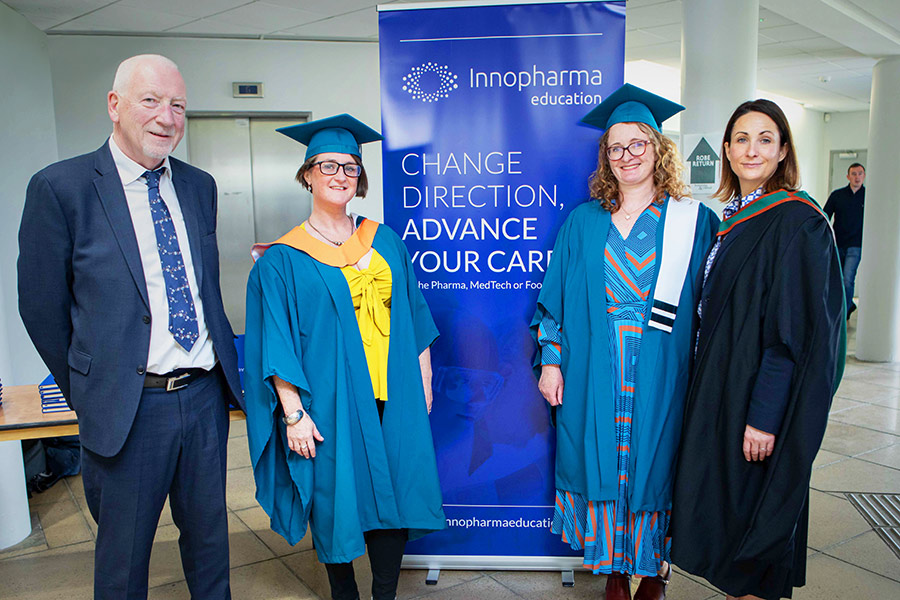What Is a Diploma and Why You Should Pursue It: An Ultimate Guide to Higher Education

Many industries, such as food science, MedTech, and biopharmaceutical industries, are nuanced and heavily research-based. Because of this, most companies look for candidates who have the proper education and experience to complete their daily responsibilities.
For many of these careers, the higher the level of education, the more a candidate’s knowledge and experience are targeted to the specific industry. That’s why pursuing higher education, such as a diploma, is necessary when seeking careers in these fields.
We’ve created an ultimate guide to higher education, including answering questions like “what is a diploma,” and “which is better, a diploma or a certificate.” You’ll find everything you need here.
Looking for something specific? Jump to section:
- What is a Diploma?
- How Long Does It Take to Get a Diploma?
- What Can You Do With a Diploma?
- Why Study with Innopharma?
What is a Diploma?
As you begin researching universities and programmes for any industry, you’ll see that many offer courses to complete a diploma. But, you may find yourself asking, “what is a diploma in the first place?”
A diploma is both an award and a qualification received after completing a diploma programme that is offered through post-secondary institutions, such as Innopharma.
Is a Diploma the Same as a Degree?
There is a lot of jargon regarding degrees and diplomas. Part of understanding what a diploma is means understanding how the two differ. While diplomas are often recognised on the same level as certain degrees, they are not the same as degrees.
How Are Diplomas and Degrees Different?
A degree consists of a curriculum of core and degree-specific courses. These programmes of study tend to take 3-4 years to complete.
A diploma, on the other hand, consists of hands-on training in a very niche category within an industry. For example, Innopharma offers diplomas related to medical device technology, a subset of natural and life sciences.
Diplomas also tend to be less of a time and monetary investment.

Is a Diploma the Same as a Certificate?
While similar to a post-graduate degree and a post-graduate diploma, a post-graduate certificate is still considered a different programme. A certificate programme consists of a narrow field of study, similar to a post-graduate diploma. However, certificate programmes are usually even shorter than diplomas.
Which Is Better: A Diploma or Certificate?
Determining which is better, a diploma or a certificate, depends on your career path, needs, and goals.
Certificate programmes are usually shorter than post-graduate degrees or diplomas. They also tend to cost less. However, they’re limited in providing wide and balanced education and training. And they don’t allow you to land higher positions or roles as a master’s degree or a diploma would.
A diploma, on the other hand, is longer than a certificate programme, but not as long as a master’s degree programme. They’re also excellent in allowing you to master specialised skills in your industry. These skills can give you a competitive edge when either making a career change or when landing new roles.
What Are the Different Types of Diplomas?
There are two different types of diplomas someone can receive in Ireland. Both are recognised on the National Framework of Qualifications (NFQ), and both can be extremely useful when furthering your career.
What Is a Higher Diploma?
The higher diploma is available to those who have already completed an honours bachelor’s degree. These diploma programmes are best for those who are looking to make a career change into a different industry but need to be caught up on industry standards and practices.
For example, if someone received a bachelor’s degree in journalism but wanted to make an industry change into food science, they would need to consider a higher diploma in food science and technology.
This would give them the foundations needed to enter the industry without having to receive an entirely new bachelor’s degree in food science.
Higher diplomas are often one year of full-time study to receive the necessary education and training for the diploma. Typically, once you’ve received your diploma at this level of studies, you’ll be ready to take on an entry-level career in your new industry.
What Is a Post-Graduate Diploma?
This type of diploma is available to those who have completed their bachelor’s degree and want to continue honing their education and training within one specific field. They’re intended to expand on knowledge and training completed within a bachelor’s degree.
Post-graduate diplomas are often vocational, meaning courses are likely to teach a specific trade.
For example, if someone completed their bachelor’s degree in biology, then they may further enhance their education by obtaining a postgraduate diploma in medical device technology and business.

What NFQ Level is a Diploma in Ireland?
Many job applications for major businesses will state their requirements for candidates. Among those requirements, you may notice different NFQ levels. These relate to your graduate and postgraduate qualifications.
For diplomas those are:
The Higher Diploma
According to the National Framework of Qualifications (NFQ), a higher diploma is considered a level 8 award, which is the same level of studies as an honours bachelor’s degree.
Post-graduate Diploma
The post-graduate diploma is considered a level 9 award on the National Framework of Qualifications. It’s technically the same degree level as a master’s degree.
How Long Does It Take to Get a Diploma?
Fortunately, diplomas of both types don’t require as much of a time commitment as a bachelor’s, honours bachelor’s, or even a master’s degree.
Many of the institutions and universities offering programmes have multiple options when it comes to how long a diploma takes, the course load, and the locations on where to complete the programme.
Typically you can expect:
- A higher diploma usually takes 1 year to complete. Depending on the course of study, some programmes are offered online, on campus, or a combination of the two.
- A postgraduate diploma usually takes 1-2 years to complete, depending on the programme. Similar to higher diplomas, postgraduate diplomas may be offered online, on campus or in a blended learning setting.
What Can You Do With a Diploma?
As we mentioned earlier, a diploma is great for helping you master specialised skills in your industry. Adding a higher or postgraduate diploma to your CV can give you the competitive advantage to land new roles in your career field.
Here are just a few of the popular careers you can step into with a diploma:
Popular Careers in the Biopharmaceutical Industry
The biopharmaceutical industry is one of the most up-and-coming industries in Ireland. More and more of the major companies in the industry are looking for new, qualified talent. A diploma can help you take the next step into one of these careers:
- Clinical Research Associate
- Quality Assurance Technician
- Process Technician
You can read more about these careers and more careers in our blog about jobs within the pharmaceutical industry.
Popular Careers in the MedTech Industry
Similar to the biopharmaceutical industry, the MedTech and medical device industry is expanding rapidly on the Emerald Isle. Many of the top medical device companies in Ireland are seeking out qualified candidates to help them continue growing.
Here are some of the careers a diploma can help you land:
- Product Designer
- Process Technician
- Medical Device Sales
You can read more about these careers and others in our detailed blog on jobs within the MedTech industry.
Popular Careers in the Food Science Industry
The food science industry is crucial to our at-home health and nutrition. Careers in this field involve researching, processing, and preserving foods that go to the market to feed the public market.
Here are some of the careers a diploma can help you find:
- Food Science Technician
- Product Developer
- Toxicologist
You can find out more about these positions and others in our blog about food science careers.
Why Study with Innopharma?
Innopharma has a range of diploma programmes to help you in your journey of either changing industries, upskilling in a particular industry, or landing an elevated role in the career field of your choice.

Whether you’re looking for diplomas in the pharmaceutical industry, the MedTech industry, or food science, we have something for you.
For diplomas in the pharmaceutical industry:
- PG Dip Pharmaceutical Business & Technology
- Higher Dip in Biopharmaceutical & Medical Devices Manufacturing
For diplomas in the MedTech industry:
- PG DIP Medical Device Technology & Business
- Higher Dip Biopharmaceutical & Medical Devices Manufacturing
For diplomas in the food science industry:
Find out more about all of our opportunities in our degree and diploma programmes or get in touch with us today to discuss your career options.



















